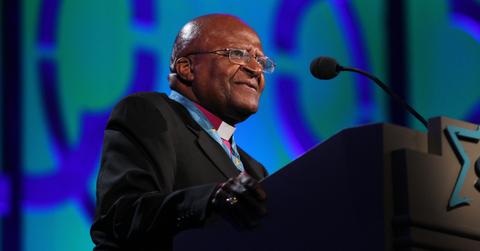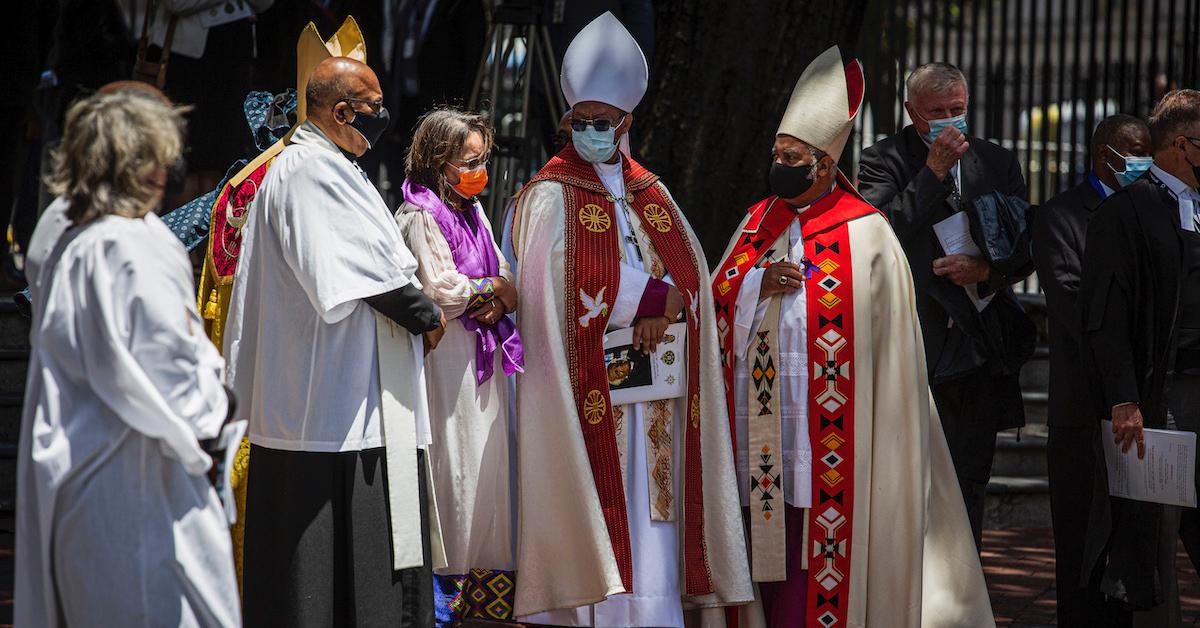Desmond Tutu Had an Eco-Friendly Burial With Water Cremation
Published Jan. 3 2022, 3:47 p.m. ET

We've lost several icons these past few weeks, including former South African Archbishop, Desmond Tutu. The Nobel Peace Prize winner sadly passed away at age 90 on Sunday, Dec. 26, and because of the environmental work he did throughout his career, we couldn't be less surprised the Nobel Peace Prize winner opted for his body to undergo aquamation after his passing. But what is aquamation, and how does it benefit the environment?
As reported by The Guardian, Archbishop Desmond Tutu will be put to rest via aquamation." The outlet describes it as "an increasingly popular and environmentally-friendly alternative to traditional cremation methods, using water instead of fire."
Keep reading to learn more about this eco-friendly alternative to traditional burial methods.

What is aquamation?
The process of aquamation, which is also known as alkaline hydrolysis or water cremation, involves a similar decomposition process to what would take place if the body broke down naturally underground. According to NPR, it applies water, alkaline chemicals, and high heat, which speed up the natural decomposition process. The body is placed in a container that's made from stainless steel, and filled with 95 percent water and 5 percent alkali. It's then heated at up to 300 degrees Fahrenheit for about eight hours.
Once the process is complete, only the bones remain — the organs, skin, and other matter have decomposed. The remaining bones are then broken down into ash, and they are generally kept in an urn.
Cremation in general takes up less space than traditional burial methods. Burial spaces, particularly in cities, has become harder to find and has become exponentially pricer. It's also a "gentler way to go," per The Guardian.
This is opposed to traditional cremation, which is custom in certain cultures, though it has a much higher impact. Traditional cremation applies temperatures of up to 1,600 degrees Fahrenheit to the body, taking two approximately two hours to break down the body. But the high heat requires quite a bit of energy. According to Seattle Times, a funeral could slash emissions by up to 90 percent when opting for aquamation as opposed to cremation.

The state funeral of late Archbishop Emeritus Desmond Tutu on Jan. 1, 2022 in Cape Town, South Africa. Desmond Mpilo Tutu OMSG CH GCStJ was as much known for his work as an anti-apartheid and human rights activist as his religious status. He was the first black Bishop of Johannesburg from 1985 to 1986 and then Archbishop of Cape Town from 1986 to 1996. He worked alongside a newly-released Nelson Mandela leading negotiations to end apartheid in the country and introduce a multi-racial democracy. As President of South Africa, Mandela chose Tutu to lead the Truth and Reconciliation Commission. Tutu died on December 26, 2021 aged 90 leaving wife Nomalizo Leah Tutu and four children. (Photo by Charlie Shoemaker/Getty Images)
Desmond Tutu opted to have his body undergo aquamation.
As previously mentioned, Desmond Tutu has chosen to have his body undergo aquamation. According to CNN, Tutu's loved ones gathered on Sunday, Jan. 2 at St. George's Cathedral for a private service. There, his ashes, post-aquamation, have been placed in a simple, yet eco-friendly, pine tomb, per his request. He had requested the "cheapest available" tomb.
It comes as no surprise that Tutu requested an eco-friendly burial method, as he was incredibly passionate about the environment. In 2007, he wrote an op-ed for The Guardian about environmental intersectionality, and spoke about it at the 2014 UN Climate Summit. He created a petition in 2015 that called on world leaders to transition to renewable energy, and even participated in a YouTube special called Dear Earth shortly before his passing alongside Kermit the Frog and Barack Obama.
Tutu's environmental contributions, even after he's passed, won't be overlooked. Needless to say, he will be missed in the world of sustainability.